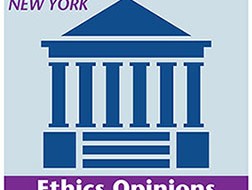Charging Interest on Unpaid Fees or Disbursements
By Roy Simon [Originally published in NYPRR September 2000]
May lawyers ethically charge interest on unpaid legal fees? May they charge interest on unpaid disbursements in contingent fee cases? In a pair of opinions issued in July 2000, the ethics committees of the New York City and New York State bars addressed these questions and gave an answer that many attorneys will like: “yes.” But interest charges raise some subtle ethics questions, so lawyers who want to charge interest should read the full text of the two opinions that are summarized in this article.
N.Y. City Bar Op. 2000-02 (2000) — Interest on Unpaid Legal Fees: May a lawyer ethically charge a client interest on unpaid legal fees if the retainer agreement expressly provides for interest charges? Yes. No Code provision expressly prohibits a lawyer from charging interest to a client who dishonors a fee arrangement. Thus, based on DR 2-101(C)(3), DR 2-106, EC 2-17, EC 2-18, and EC 2-19, a retainer agreement may provide for charging interest on unpaid legal fees when “(1) the lawyer fully informs the client of the circumstances where interest may be charged, (2) those circumstances, the fee, and the interest rate are reasonable, and (3) the client consents.”
What if the retainer agreement is silent about interest charges? This is a more difficult question, and the Code does not address it. However, as a practical matter, clients faced with the choice between paying obligations to other creditors that carry interest charges and legal bills that do not carry interest charges may be irresistibly tempted to delay paying the lawyer’s bill. “Given this reality, we believe allowing interest to be imposed, and placing lawyers on a more equal footing with other creditors can … serve the salutary purpose envisioned by EC 2-23 of avoiding fee disputes.”
Conversely, a rule prohibiting interest charges could foster litigation because a lawyer prevailing in fee litigation can recover prejudgment interest under CPLR §§5001 “from the earliest ascertainable date the cause of action existed.” And under New York case law, a lawyer may assert a cause of action against a client for an “account stated” merely by proving that a client failed to object to a lawyer’s bill for an “unreasonable period of time.” Significantly, an account stated will be enforced with interest even if the bill is unitemized, even if there was no initial retainer agreement between the attorney and client, and even though there was initially no express agreement to pay interest. (However, it is “far better practice to address all the terms of an engagement, including all payment provisions and any interest to be charged on past due bills, in a written retainer agreement entered into at the inception of the engagement.”)
How Much Interest?
How much interest may a lawyer charge? Under DR 2-106 and EC 2-17, a lawyer shall not charge a client an “illegal or excessive” fee, and the fee must be “reasonable.” Even though interest is not part of the actual fee, but rather compensation for the client’s delay in paying the fee, “the rate of interest should be subject to the same reasonableness requirement.” (In addition, interest charges “must also comply with all applicable laws, including usury laws.”)
N.Y. State Bar Op. 729 (2000) — Interest on Unpaid Disbursements: “May a lawyer charge interest on disbursements paid by the lawyer on the client’s behalf in a contingency fee representation?” Yes, subject to certain conditions. The Committee has previously opined that a lawyer may charge interest on delinquent legal fees if (1) the lawyer clearly advises the client before performing services of the fact that interest will be charged on accounts which are delinquent for more than a stated period of time, (2) the stated period is reasonable under all the circumstances of the matter, (3) the rate of interest is reasonable, (4) the fee is not excessive, and (5) the client consents to the interest charge. The issue here is whether, under DR 2-106(A), a similar interest charge may be imposed on disbursements in contingent fee cases.
In N.Y. City Bar Op. 1997-1 (1997), a lawyer in a contingent fee matter had actually borrowed funds from a bank, at his own expense, in order to advance litigation expenses for the client. The City Bar’s ethics committee concluded that the lawyer could charge the client interest on the funds advanced to pay these litigation expenses at the rate charged by the bank, as long as (a) the interest charge did not exceed the interest charges actually incurred by the lawyer, (b) the lawyer clearly explained the charges to the client in advance and the client agreed to them, and (c) the lawyer provided the client with a writing stating the method by which the fee was to be determined.
Guides for Interest on Disbursements
Here, the inquiring attorney will not be borrowing the funds that will be advanced to the client, but that distinction may be immaterial because a lawyer who advances funds for a client is losing the use of those funds. While only the lawyer who borrows funds is “out of pocket,” both lawyers have incurred an “economic cost.” Accordingly: [A] contingent fee attorney may impose an interest charge on unpaid disbursements as long as
(1) the client is clearly advised that an interest charge will be imposed on disbursements that are not paid within a stated period of time and the client consents to that arrangement before it goes into effect,
(2) the client is billed for the disbursements promptly so the client may decide whether to pay the disbursements or incur the interest charge,
(3) the period of time between the bill and the imposition of the interest charge is reasonable,
(4) the disbursement itself is appropriate, and
(5) the interest rate is reasonable.
Whether a given rate of interest is reasonable “cannot be determined in the abstract,” but “we do not believe that an interest rate exceeding the lawyer’s actual or putative cost of obtaining funds would ever be reasonable in a contingency fee matter.” Of course, interest charges are also subject to laws and rules outside the Code. For example, contingent fees in wrongful death and personal injury cases are governed by court rules. The Committee does not opine on whether the proposed interest charge is permissible under these rules, or on whether a court would consider an interest charge appropriate in any case where contingent fees are subject to court approval.
In addition, the lawyer must comply with DR 2-106(D). “[B]ecause the interest charge is part of a contingent fee arrangement, the interest charge must be included in the written statements required at the beginning and end of a contingent fee representation.”
Roy Simon is Professor of Law and Director of Hofstra’s Institute for the Study of Legal Ethics. He annually writes Simon’s New York Code of Professional Responsibility Annotated.
DISCLAIMER: This article provides general coverage of its subject area and is presented to the reader for informational purposes only with the understanding that the laws governing legal ethics and professional responsibility are always changing. The information in this article is not a substitute for legal advice and may not be suitable in a particular situation. Consult your attorney for legal advice. New York Legal Ethics Reporter provides this article with the understanding that neither New York Legal Ethics Reporter LLC, nor Frankfurt Kurnit Klein & Selz, nor Hofstra University, nor their representatives, nor any of the authors are engaged herein in rendering legal advice. New York Legal Ethics Reporter LLC, Frankfurt Kurnit Klein & Selz, Hofstra University, their representatives, and the authors shall not be liable for any damages resulting from any error, inaccuracy, or omission.
Related Posts
« How to Protect Against Inadvertent Disclosure of Privileged Documents The Heat Subsides: Future of MDPs in New York »













